SUMMARY
This is AI generated summarization, which may have errors. For context, always refer to the full article.
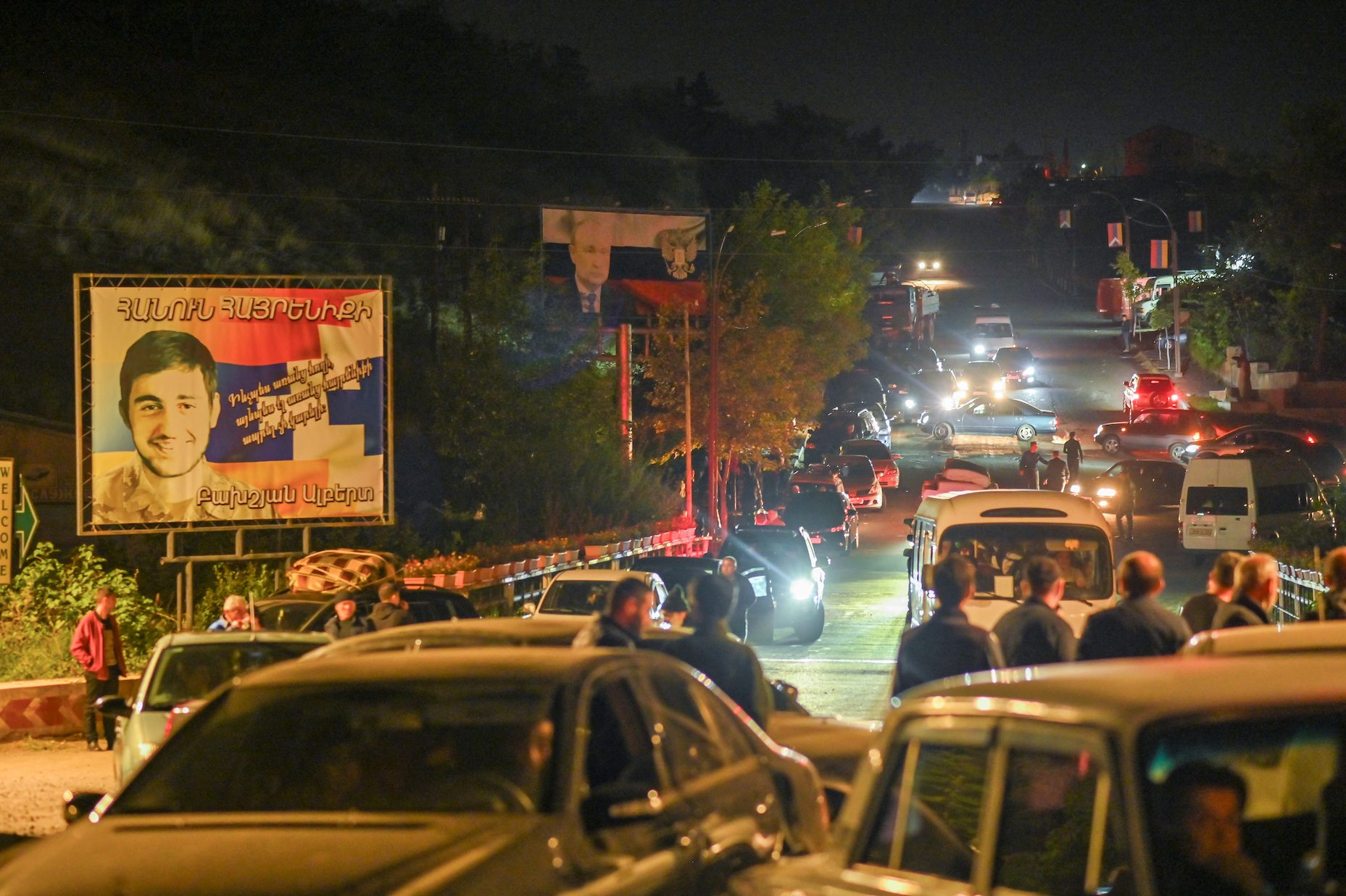
STEPANAKERT-KHANKENDI, Azerbaijan – Thousands of ethnic Armenians fled the breakaway region of Nagorno-Karabakh on Monday, September 25, queuing up for fuel and jamming the road to Armenia after their decades-old separatist state was defeated by Azerbaijan in a lightning military operation.
The leadership of the 120,000 Armenians who call Karabakh home told Reuters on Sunday, September 24, that they did not want to live as part of Azerbaijan and that they would leave for Armenia because they feared persecution and ethnic cleansing.
In the Karabakh capital, known as Stepanakert by Armenia and Khankendi by Azerbaijan, crowds of people were loading belongings into buses and trucks as they left for Armenia.
Refugees who reached Armenia told Reuters they believed the history of their breakaway state was finished.
“No one is going back – that’s it,” Anna Agopyan, who reached Goris, a border town in Armenia, told Reuters. “The topic of Karabakh is over now for good, I think.”
Srbuhi, a mother of three who reached Armenia, shed tears as she held her young daughter.
“I left everything there,” she said.
The Armenian government, making preparations for thousands of refugees, said that as of 5 am (0100 GMT) on Monday, more than 2,900 people from Nagorno-Karabakh had crossed into Armenia.
The ethnic Armenian leadership said it would remain in place until all those who wanted to leave what they call Artsakh were able to go. Meanwhile, they urged residents to hold back from crowding the roads out, to allow the evacuation of the injured.
“We inform you that all citizens who wish to move from Artsakh to Armenia will have that opportunity,” the leadership said. It said free fuel would be provided later on Monday for all those who wanted to leave the territory.
The Armenians of Karabakh, a territory internationally recognized as part of Azerbaijan, were forced into a ceasefire last week after a 24-hour military operation by the much larger Azerbaijani military.
Azerbaijan’s President Ilham Aliyev hosted his ally Turkish President Tayyip Erdogan on Monday in the autonomous Nakhchivan exclave – a strip of Azerbaijani territory separated from the rest of the country by Armenia.
They were to attend a ceremony for a pipeline that will bring gas to Nakhchivan and inaugurate a newly modernized military installation in the exclave, Turkey said.
Karabakh
The Azerbaijani victory alters the delicate balance of power in the South Caucasus region, a patchwork of ethnicities crisscrossed with oil and gas pipelines where Russia, the United States, Turkey and Iran are jostling for influence.
Since the breakup of the Soviet Union, Armenia had relied on a security partnership with Russia, while Azerbaijan grew close to Turkey, with which it shares linguistic and cultural ties.
The United States has said it was deeply concerned by Azerbaijan’s military operation, which Baku launched on September 19 after what it said were terrorist attacks on its civilians by Karabakh fighters.
The Armenians of Karabakh said Russia, the West and Armenia itself had abandoned them, and some spoke through tears of the end of an era for the Karabakh Armenians.
Petya Grigoryan, a 69-year-old driver, said his village in what the Armenians know as the Martakert district of Karabakh had been pummeled by Azerbaijan armed forces. There were two KAMAZ-truckloads full of civilian dead in the village, he said.
“There was nowhere to bury them,” Grigoryan told Reuters
Of the 500 villagers, he said 40 had got out.
Reuters was unable to independently verify his account but it chimed with the outline given by other ethnic Armenians fleeing Karabakh, which Azerbaijan says will be turned into a “paradise” and fully integrated.
Azerbaijan’s victory
Azerbaijan’s victory reverses a humiliating defeat the country suffered as the Soviet Union broke up, which left around a seventh of its population homeless and Armenians in control of swathes of territory around Karabakh.
Nagorno-Karabakh has over the centuries come under the sway of Persians, Turks, Russians, Ottomans and Soviets. It was claimed by both Azerbaijan and Armenia after the fall of the Russian Empire in 1917 and in Soviet times it was designated an autonomous region within Azerbaijan.
From 1988-1994 about 30,000 people were killed and more than a million people, mostly ethnic Azeris, displaced as the Armenians threw off nominal Azerbaijani control in what is now known as the First Karabakh War.
Azerbaijan gained back territory in and around Nagorno-Karabakh in a second war in 2020, which ended with a Moscow-brokered peace deal and the deployment of a contingent of Russian peacekeepers.
Erdogan, who backed Azerbaijan with weaponry in the 2020 conflict, said last week he supported the aims of the Azerbaijan’s latest military operation but played no part in it.
Armenia says more than 200 people were killed and 400 wounded in last week’s Azeri operation. Armenian Prime Minister Nikol Pashinyan, who is facing calls to resign from protesters in Yerevan, has blamed Russia for failing Armenia.
Pashinyan has said some unidentified forces were seeking to stoke a coup and has accused Russian media of engaging in an information war against him.
Kremlin spokesman Dmitry Peskov on Monday reiterated that Russia considers Armenia its ally and remains in contact with its leadership. He rejected Yerevan’s attempts to blame Moscow for the situation in Karabakh.
“We understand the emotional intensity of this moment, but we strongly disagree with the attempt to place responsibility on the Russian side and especially on the Russian peacekeepers, who are showing true heroism in carrying out their functions,” Peskov told reporters. – Rappler.com
Add a comment
How does this make you feel?

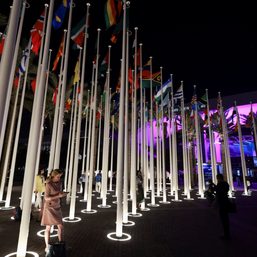
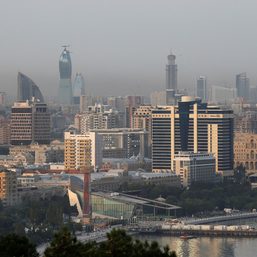
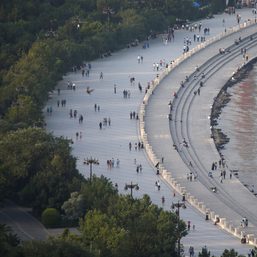
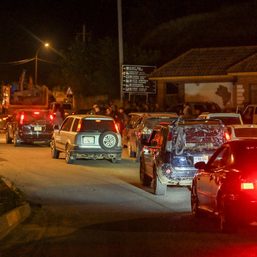
There are no comments yet. Add your comment to start the conversation.